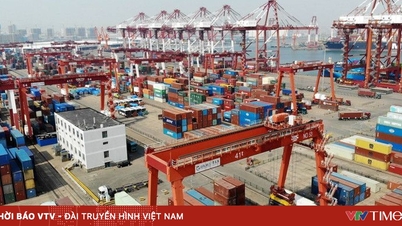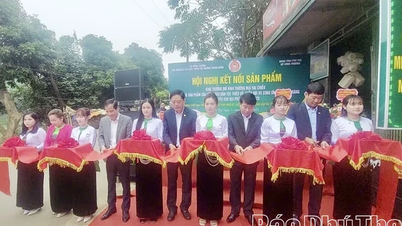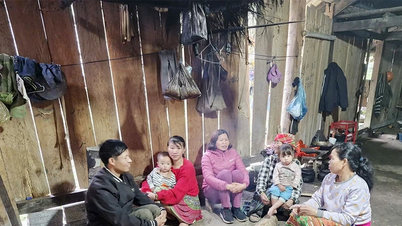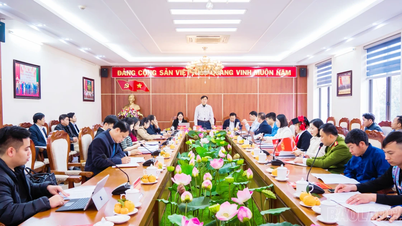Resolution 68 is not just a policy from the central government; it is gradually being put into practice through clear action plans, specific growth figures, and the determination of local authorities to improve the investment environment. Phu Tho , with its new look after the merger, is emerging as a "promised land" for private enterprise development.
Three regions, one common goal
On May 4, 2025, the Politburo issued Resolution No. 68-NQ/TW on continuing to strongly reform mechanisms and policies to create favorable conditions for the development of the private economy, affirming that it is "an important driving force of the socialist-oriented market economy." At that time, three localities: Phu Tho, Hoa Binh, and Vinh Phuc, promptly issued specific action plans to realize the resolution, with clear targets and a long-term vision extending to 2045.
Phu Tho province aims to have over 19,000 private enterprises by 2030, with the private sector contributing approximately 62-65% of its GRDP; and strives to reach 30,000 enterprises by 2045, accounting for 67-70% of the GRDP. The development direction is defined as building highly competitive private enterprises that participate deeply in value chains, innovate technologically, undergo digital transformation, and promote green development.
Legacy Hill Resort & Villa is a prime example of green tourism development and high-end real estate in the area.
For Hoa Binh province, the action plan aims to have 7,500 private enterprises by 2030, contributing over 55% of GRDP; and 11,300 enterprises by 2045, contributing over 60% of GRDP, with the expectation of forming strong enterprises in the fields of high-tech agriculture, ecotourism, and sustainable mineral processing.
With its early industrial development foundation, Vinh Phuc has set the following goals: By 2030, it aims to have approximately 20,000 private enterprises and 80,000 individual business households, with the private sector contributing about 35% of the GRDP; by 2045, it aims to have 50,000 enterprises, accounting for 45% of the GRDP, developing into a strong branded private economic zone in the Northern region.
A common thread in all three plans is the strong shift from "encouragement" to "concretization through targets, actions, and roadmaps." Each locality clearly identifies priority sectors, business development targets, GRDP share, as well as support solutions – digital transformation, institutional improvement, development of high-quality human resources, etc. – creating a solid foundation so that when merged into one province, policies can be integrated, synchronized, and upgraded on a larger scale.
Businesses are thriving, and the economy is accelerating.
While the action plans demonstrate a unified direction, the figures for the first six months of 2025 prove that this is gradually taking shape in practice. According to the General Statistics Office, after the merger, Phu Tho's economy recorded a GRDP growth rate of 10.09%, ranking 9th nationwide. Specifically, the industrial and construction sector grew by 15.32%, and the service sector by 8.2%, showing a strong economic recovery after the period of administrative restructuring and boundary adjustments.
Notably, the number of new businesses has grown beyond expectations. 1,878 new businesses were established, a 32% increase compared to the same period last year. An additional 818 businesses resumed operations, bringing the total registered capital in the province to over 17,400 billion VND. This is not only a positive sign of confidence in the investment environment but also an indicator that policies are being effectively implemented.
According to Mr. Ha Trung Nguyen, Permanent Vice Chairman of the Association of Businesses in the former Hoa Binh region, Resolution 68 is like a breath of fresh air for the private business sector, but for the sails to truly be full of wind, solid "support" is needed, from administrative procedure reform, assistance in accessing capital, and improving the quality of local labor. "We are waiting for a unified, synchronized policy across the entire province – something the Provincial People's Committee is urgently developing," he said.
In fact, each region has shown different signs of breakthrough. According to the Phu Tho Provincial People's Committee Office, Vinh Phuc province continues to maintain its advantage in attracting foreign direct investment (FDI) with over $410 million in the first six months, accounting for nearly 90% of the province's total FDI after the merger ($469 million). Phu Tho attracted $56 million, while Hoa Binh, although still modest ($2.7 million), has a strong advantage in domestic direct investment (DDI), with a total registered capital of up to VND 38,006 billion, thanks to large projects in ecotourism, resorts, and green industries.
Projects such as the Serena Resort expansion in Kim Boi, the new urban area in Viet Tri, or the supporting industrial zones in Binh Xuyen and Phuc Yen... not only generate significant investment capital but also open up expectations for jobs, accompanying services, and increased local value chains. This aligns with the previous orientation of all three localities: not developing the private economy at all costs, but focusing on in-depth, controlled development, linked to improving labor productivity and transforming the growth model.
Although the initial results are commendable, Phu Tho still has much work to do to truly make the private sector "a significant driving force" as envisioned in Resolution 68. The disparities between regions in terms of enterprise size, infrastructure quality, and competitiveness remain major obstacles. While Vinh Phuc has a fairly complete industrial ecosystem, many areas in the former Hoa Binh province still lack production space, logistics infrastructure, and especially high-quality technical human resources.
Furthermore, following the merger, the three economic regions, each with its own distinct policies, procedures, and incentives, pose a challenge in establishing a synchronized, transparent, and consistent investment environment. Many businesses report still feeling "confused" when accessing supporting information, investment incentives, or land use planning.
Therefore, the Provincial People's Committee is urgently implementing a unified action plan for the newly merged Phu Tho province in July 2025, based on Resolution No. 202/2025/QH15 of the National Assembly on the organization of local government after mergers. This plan will serve as the basis for integrating development indicators, allocating resources, improving administrative procedures, and removing the "invisible barriers" between the three former regions.
Phu Tho, in its new form, has the potential, momentum, and high expectations for breakthroughs. However, for the private sector to truly become a pillar of the economy, the most important thing is that commitments must be concretized in each policy, and each process must be streamlined for businesses.
Nguyen Yen
Source: https://baophutho.vn/kich-hoat-dong-luc-kinh-te-tu-nhan-236332.htm


















































































































Comment (0)